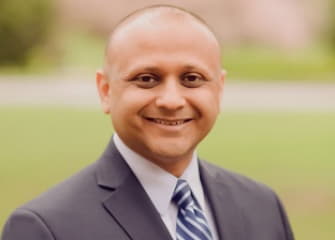
Harsh K. Trivedi, M.D., MBA
Click here for Part I & Part III
Largest non-profit provider of mental health, substance use, special education, and social support services in the nation
Harsh K. Trivedi, M.D., MBA is the president and CEO of Sheppard Pratt Health System (SPHS). A nationwide resource, SPHS provides 2.3 million services annually across a comprehensive continuum of care spanning hospital-based and community services. Since its founding in 1853, SPHS has been innovating the field with research, best practice implementation, and a focus on improving the quality of mental health care on a global level. SPHS has been consistently ranked as a top national psychiatric hospital by U.S. News & World Report for the past 26 years.
EDWIN WARFIELD: How is Sheppard Pratt different from other, comparative mental health facilities?
HARSH TRIVEDI: The Sheppard Pratt Health System is actually like no other nationally. What I mean by that is that we have a host of different services. Depending on how you interface with us, there are some people that really know us for our inpatient psychiatric services. We operate two major campuses for inpatient services: We have our main campus in Towson; we also have another campus that is in Howard County, currently Ellicott City, soon to be moving to another brand new location in the next few years. In that space, we have around 400 inpatient psychiatric beds, which are really defined by type of diagnosis, as well as what specific patients need.
Beyond that, we have day hospitals. Think about folks that, for example, have geriatric memory issues, to folks that have addiction issues, to children and adolescents—there are different programs for each patient population. Those are, by definition, places where people are coming in, getting intensive care, and going home at the end of the day. And then we have outpatient programs. This is all within the realm of kind of psychiatric services.
We also operate 13 schools, all over the State of Maryland. These are basically for students who have severe emotional, behavioral, as well as developmental issues. These are kids who really are not able to succeed with an inclusionary environment in their local school, and these are some of the kids that have kind of severe presentations where they haven’t really excelled anywhere. They come to our schools and really get meaningful care, where they graduate from high school, they end up getting into real jobs, and they have pretty productive lives.
In addition to that, we are also one of the largest providers of what we would call “social services.” For example, through Sheppard Pratt and its affiliate family services, we operate the domestic violence shelter in Montgomery County. We also, for example, in Baltimore City at the North Baltimore Center, provide over a million free meals a year. And across a number of our organizations we actually are one of the larger providers of veterans’ services. We have programs where we take homeless veterans off the street, we provide them with housing, we get them linked up to their healthcare needs, and then we also get them into jobs and get them back up on their feet.
We also work, for example, in Montgomery County with teen moms. We have childcare centers where we take care of the children. We provide those young women with access: How do you put your resume together? How do you interview for a job? How do you get yourself on your feet? How do you go back to school, get your GED? Those types of things.
And so when we say Sheppard Pratt Health System, the thought is “well, all you must be doing is seeing people who are in the hospital,” and we’re actually so much more. The reason why this is important is when you link that back to the work that I’ve done at Vanderbilt regarding population health, most of what prevents people from staying out of the hospital or doing well is not the fact that, you know, their blood pressure is now off or something else happened—it’s the fact that some of the most basic social service needs are not being met: Are you able to figure out how to get your prescription filled? Is your depression being treated so you can actually figure out what these 10 other pills are that you need to take? If you don’t have stable housing, what are you going to do?
Throughout the Sheppard Pratt system, we also own and operate a number of supportive housing locations for folks who need it at any given time.
I would argue that we actually have the engine, in terms of the different pieces, very much assembled at Sheppard Pratt in a way that doesn’t exist anywhere else in the country. Over the past year, we’ve had referrals from 42 states, as well as about eight other countries, and we provide services that are far-reaching.
In addition to direct services, we provide things that help train others to do the work that has to get done. For example, through our PBIS Program, which has been rolled out across thousands of schools nationally, we are able to impact the environment in which students learn, for about 1.2 million students.
We have innovative grants where we work with Baltimore School Police. We help them figure out how are they going to interact with youth that may be having any difficulties with their behavior, and how to interact in those situations to be positive role models and bring things to a different light.
It’s hard to get a flavor of all the things that we do, but I think in terms of overall impact, we have about 5,000 employees across the state at Sheppard Pratt, as well as through our three affiliates—Way Station, Family Services, and Mosaic—and we are both an economic engine for the state, but we are also the largest provider of mental health, substance abuse, and social services as well—not just in Maryland but across the country, in terms of nonprofits.
Connect with Harsh on LinkedIn
Sponsored by:

WMS Partners was founded in 1993 on the principles of providing our clients with the same level of service that a Chief Financial Officer (CFO) would dedicate to a successful corporation. As your advocate and central point for financial affairs, we work proactively with your service providers, including accountants, attorneys, consultants, insurance professionals and philanthropic advisors.
We are large enough that we provide exposure to many unique ideas and strategies in the investment, estate, tax, financial advisory and risk management arena; but small enough to provide discreet individualized guidance.


Edwin Warfield, CEO of citybizlist, conducts the CEO Interviews.
If you're interested in reaching CEOs, please contact edwin.warfield@citybuzz.co
Connect on LinkedIn



































